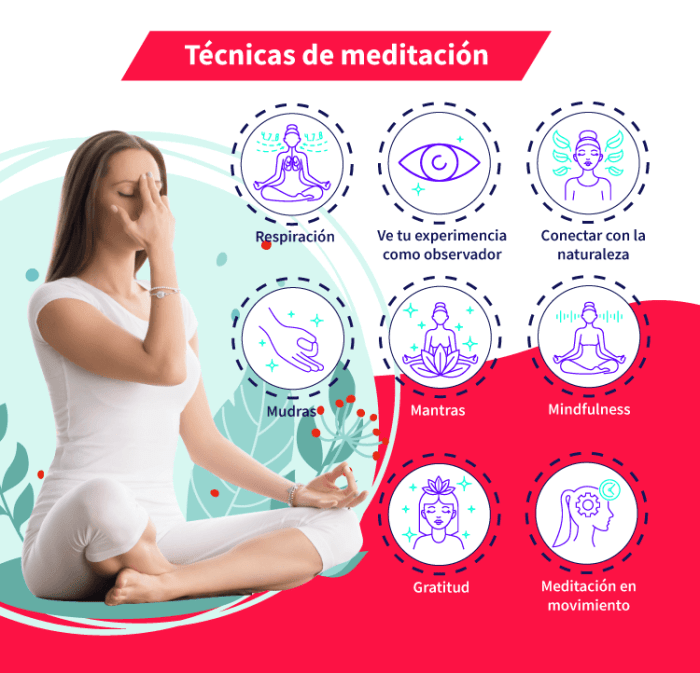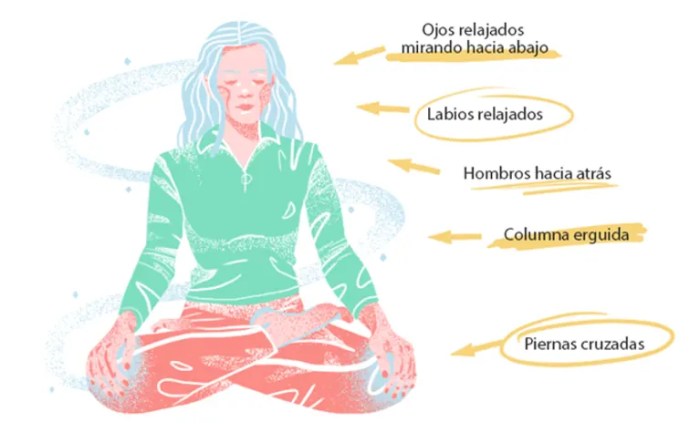Embark on a transformative journey with 10 Tips to Meditate with a Busy Lifestyle, where the hustle and bustle of everyday life harmonize with moments of stillness and self-discovery.
Unveil the secrets to integrating mindfulness into your hectic schedule and nurturing a deep connection with your inner being.
Introduction to Meditation with a Busy Lifestyle

Meditation is a powerful tool that can greatly benefit individuals with busy schedules. It offers a way to manage stress, improve focus, and increase productivity, making it essential for those leading hectic lives.
The Importance of Meditation for Busy Individuals
Incorporating meditation into a busy lifestyle can provide a much-needed break from the constant hustle and bustle. It allows individuals to pause, breathe, and center themselves amidst the chaos, leading to a sense of calm and clarity.
Benefits of Meditation in Managing Stress and Increasing Productivity
Meditation has been proven to reduce stress levels by promoting relaxation and mindfulness. By taking the time to meditate, individuals can clear their minds, release tension, and approach tasks with a renewed sense of focus and energy, ultimately boosting productivity.
Challenges of Incorporating Meditation into a Hectic Daily Routine
One of the main challenges of meditation for busy individuals is finding the time to practice regularly. With packed schedules and numerous responsibilities, carving out a few minutes for meditation can seem daunting. However, with dedication and prioritization, integrating meditation into daily routines is achievable and highly beneficial.
Setting Realistic Goals for Meditation
Setting achievable meditation goals is crucial for busy individuals to maintain a consistent practice. It is essential to start small and gradually increase the duration of your meditation sessions as you progress. Here are some tips on setting realistic goals for meditation and integrating it into your busy lifestyle:
Benefits of Short Meditation Sessions vs. Longer Ones
Short meditation sessions, even just 5-10 minutes a day, can still offer significant benefits such as stress reduction, improved focus, and a sense of calm. These shorter sessions are more manageable for busy individuals and can be easily incorporated into your daily routine. On the other hand, longer meditation sessions, while beneficial in their own right, may be harder to fit into a hectic schedule.
It’s important to find a balance that works for you and your lifestyle.
Strategies for Integrating Meditation into Daily Activities
- Start your day with a short meditation session before getting out of bed or while enjoying your morning coffee.
- Use your lunch break as a time for a quick meditation session to recharge and refocus for the rest of the day.
- Practice mindfulness during everyday activities such as washing dishes, walking, or commuting to work.
- Set reminders on your phone or calendar to schedule regular meditation sessions throughout the week.
- Find a quiet and comfortable space where you can meditate without distractions, even if it’s just for a few minutes at a time.
Remember, the key is consistency rather than duration when it comes to meditation practice. By setting achievable goals and finding creative ways to integrate meditation into your daily activities, you can experience the benefits of a calmer mind and improved well-being even with a busy schedule.
Creating a Meditation Space at Home or Work

Creating a designated meditation space can greatly enhance your meditation practice by providing a peaceful and calming environment to focus your mind and body. Having a specific spot for meditation helps in establishing a routine and allows you to disconnect from distractions.
Setting Up a Calming and Peaceful Meditation Area, 10 Tips to Meditate with a Busy Lifestyle
- Choose a quiet area: Find a space in your home or workplace that is free from noise and distractions. This could be a corner of a room, a cozy nook, or a peaceful garden.
- Add comfortable seating: Whether it’s a cushion, a yoga mat, or a chair, make sure your meditation spot is comfortable to sit on for an extended period.
- Create ambiance: Consider adding elements like candles, essential oils, incense, or calming music to enhance the soothing atmosphere of your meditation space.
- Keep it clutter-free: A tidy and organized space can help clear your mind and promote a sense of tranquility. Remove any unnecessary items that may cause visual clutter.
- Natural elements: Incorporate natural elements like plants, stones, or flowing water to bring a sense of serenity and connection to nature to your meditation area.
Consistent Meditation Practice with a Designated Space
A dedicated meditation space serves as a visual reminder of your commitment to practice mindfulness regularly. When you have a designated area for meditation, you are more likely to stick to your routine and make time for this important self-care practice.
Time Management Techniques for Meditation
Finding time to meditate can be a challenge, especially with a busy schedule. Here are some time management techniques to help you prioritize meditation in your daily routine.
Mindfulness in Time Management
One effective way to incorporate meditation into your busy lifestyle is by practicing mindfulness in time management. This involves being fully present and aware of how you spend your time throughout the day.
- Avoid multitasking: Focus on one task at a time to make the most of your time and avoid feeling overwhelmed.
- Set specific time blocks: Allocate dedicated time slots for meditation in your schedule, treating it as an important appointment.
- Eliminate time-wasting activities: Identify and reduce activities that consume your time without adding value to your day.
Prioritizing Meditation in a Packed Schedule
Here are some examples of how you can prioritize meditation even when your schedule is packed with various commitments:
- Start your day with meditation: Begin your morning with a meditation session to set a positive tone for the rest of the day.
- Take short meditation breaks: Incorporate mini meditation sessions during short breaks throughout the day to reset and refocus your mind.
- Combine meditation with other activities: Practice mindfulness while performing everyday tasks such as walking or eating to integrate meditation seamlessly into your routine.
Incorporating Mindful Activities into Daily Routine

In our fast-paced lives, finding time to meditate can be a challenge. However, incorporating mindfulness into our daily activities can help us stay present and centered amidst the chaos. By infusing mindfulness into simple tasks like eating or walking, we can cultivate a sense of calm and awareness throughout the day.
Infusing Mindfulness into Daily Activities
- Practice mindful eating: Take time to savor each bite, focusing on the taste, texture, and sensation of the food. Chew slowly and pay attention to how the food nourishes your body.
- Engage in walking meditation: Instead of rushing from one place to another, take a few moments to walk mindfully. Notice the sensation of your feet touching the ground and the rhythm of your breath.
- Mindful breathing exercises: Throughout the day, take short breaks to focus on your breath. Close your eyes, inhale deeply through your nose, and exhale slowly through your mouth. This can help calm your mind and reduce stress.
By incorporating mindfulness into daily activities, we can cultivate a sense of presence and peace, even in the midst of a busy schedule.
Benefits of Mindfulness in Everyday Life
- Reduced stress and anxiety: Mindfulness helps us stay grounded and focused, reducing the impact of stressors in our daily lives.
- Improved focus and concentration: By training our minds to be present, we can enhance our ability to concentrate on tasks and be more productive.
- Enhanced overall well-being: Practicing mindfulness regularly can lead to a greater sense of overall well-being and satisfaction with life.
Utilizing Technology for Guided Meditations

In today’s fast-paced world, technology has become an integral part of our daily lives, including our meditation practices. With the help of various apps and online resources, busy individuals can easily incorporate guided meditations into their routines to experience the benefits of mindfulness and relaxation.
Role of Technology in Supporting Meditation Practices
- Technology provides access to a wide range of guided meditation sessions, making it easier for individuals to find one that suits their preferences and goals.
- Apps and online platforms offer flexibility in terms of timing, allowing users to meditate anytime, anywhere, even in the midst of a hectic schedule.
- Guided meditation apps often include features like progress tracking, reminders, and personalized recommendations, enhancing the overall meditation experience.
Recommendations for Meditation Apps or Online Resources
- Headspace: A popular app that offers guided meditation sessions for beginners as well as advanced users, focusing on different aspects of mindfulness and mental well-being.
- Calm: Known for its soothing nature sounds and relaxation techniques, Calm provides guided meditations for stress relief, better sleep, and improved focus.
- Insight Timer: This app offers a vast library of guided meditations from teachers around the world, covering various topics such as gratitude, self-compassion, and emotional healing.
Benefits of Guided Meditations for Busy Individuals
- Guided meditations help busy individuals stay focused and present during their practice, especially when their minds are racing with thoughts and distractions.
- Listening to a guide can provide a sense of comfort and support, making the meditation process feel less daunting and more accessible, even for beginners.
- Guided meditations often incorporate breathing exercises, visualization techniques, and body scans, helping individuals relax and unwind quickly, even in short sessions.
Mind-Body Connection and Meditation
Meditation is deeply connected to the mind-body relationship, as it involves focusing the mind to achieve a state of relaxation and heightened awareness. Through meditation, individuals can tap into the connection between their mental and physical states, ultimately leading to improved overall well-being.
Improving Overall Well-Being and Reducing Stress
- Meditation helps reduce stress by calming the mind and promoting relaxation. By practicing mindfulness and being present in the moment, individuals can alleviate anxiety and tension.
- Regular meditation can also improve emotional health by fostering a positive outlook and enhancing self-awareness. This can lead to better coping mechanisms for stressors in daily life.
- By reducing stress levels, meditation can have a positive impact on physical health, such as lowering blood pressure, improving sleep quality, and boosting the immune system.
Impact of Consistent Meditation on Physical Health
- Consistent meditation has been associated with numerous physical health benefits, including reduced inflammation in the body, which is linked to various chronic diseases.
- Meditation can also help in pain management, as it enhances the body’s ability to cope with discomfort and improves pain tolerance.
- Furthermore, regular meditation practice has been shown to support cardiovascular health by reducing the risk of heart disease and stroke.
Overcoming Mental Barriers to Meditation: 10 Tips To Meditate With A Busy Lifestyle
Mental barriers can often impede individuals from fully embracing a meditation practice. These barriers may manifest as distractions, doubts, or resistance that hinder the ability to focus and relax the mind. Overcoming these obstacles is essential for reaping the benefits of meditation and cultivating a sense of inner peace.
Identifying Common Mental Barriers
- Overactive Mind: Constant thoughts and mental chatter can make it challenging to quiet the mind during meditation.
- Impatience: Expecting immediate results or feeling frustrated with the process can create resistance.
- Perfectionism: Striving for a perfect meditation experience can lead to self-criticism and frustration.
Strategies for Overcoming Distractions
- Practice Mindfulness: Acknowledge distractions without judgment and gently guide your focus back to the present moment.
- Set Intentions: Establish clear intentions for your meditation practice to stay focused and committed.
- Use Guided Meditations: Follow guided meditation sessions to help stay on track and minimize distractions.
Tips for Cultivating a Positive Mindset
- Practice Self-Compassion: Be kind to yourself and embrace imperfections as part of the meditation journey.
- Celebrate Progress: Recognize small achievements in your practice to boost motivation and positivity.
- Stay Consistent: Establish a regular meditation routine to build momentum and create a positive habit.
Social Support and Accountability in Meditation

When it comes to maintaining a regular meditation practice, having social support can make a significant difference. Connecting with like-minded individuals who share your meditation goals can provide encouragement, motivation, and accountability.
Importance of Social Support
Having a support system in place can help you stay consistent with your meditation practice. Knowing that there are others who are on a similar journey can provide a sense of community and belonging, making the practice more enjoyable and sustainable.
Accountability Partners or Groups
Accountability partners or groups can be instrumental in helping you stay committed to your meditation goals. By checking in regularly with someone who shares your aspirations, you can hold each other accountable and provide mutual support and encouragement.
Finding Like-Minded Individuals
To find like-minded individuals to support your meditation goals, consider joining meditation classes, workshops, or online communities. Look for local meditation groups or seek out meditation buddies who can accompany you on your mindfulness journey.
Celebrating Progress and Staying Motivated
As a busy individual trying to incorporate meditation into your lifestyle, it’s essential to acknowledge and celebrate the small milestones you achieve along the way. Recognizing your progress can help boost motivation and keep you committed to your meditation practice.
Significance of Celebrating Small Milestones
- Take note of the days when you meditate consistently, even if it’s just for a few minutes.
- Reflect on how you feel after each meditation session and acknowledge any improvements in your focus or stress levels.
- Share your achievements with a friend or a meditation buddy to celebrate together and receive positive reinforcement.
Strategies for Staying Motivated
- Set specific goals for your meditation practice, such as increasing the duration or frequency of your sessions gradually.
- Experiment with different meditation techniques to keep your practice engaging and prevent monotony.
- Reward yourself for reaching milestones, whether it’s treating yourself to a relaxing activity or indulging in a small gift.
Long-Term Benefits of Consistent Meditation Practice
- Improved focus and concentration, leading to increased productivity in your daily tasks.
- Reduced stress and anxiety levels, promoting better mental health and overall well-being.
- Enhanced self-awareness and emotional regulation, allowing you to navigate challenges with more clarity and resilience.
Outcome Summary
As you embrace these insightful tips, may you navigate the tumultuous waves of life with grace and serenity, anchoring yourself in the essence of mindfulness and self-care.